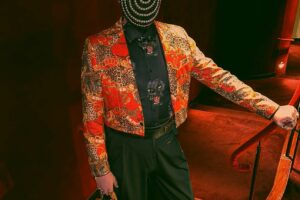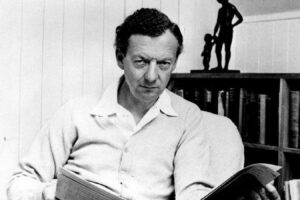
The most wonderful thing about opera on video is the vicarious thrill of seeing performances of important works in the most glamorous foreign theaters in gala presentations with musicians of great renown for a piddling fraction of the cost. This performance of Luigi Cherubini’s Koukourgi isn’t even close to such an occasion. Here we are at the Stadttheater Klagenfurt for the world premiere of this opéra-comique that was written shortly after its composer retired to the provinces to wait out the revolutionary unpleasantness in Paris. Where is Klagenfurt? Well, you should ask. It’s a little haven in southern Austria near the border of Slovenia. It’s about 300 miles from Salzburg by car but much, much further musically, if you perceive my meaning.
Oddly, in spite of Cherubini’s enormous success with the French public, Koukourgi was never mounted until these performances in September 2010. A critical edition of the music was prepared by Heiko Cullmann. The original libretto by Honoré Nicolas Marie Duveyrier was lost along the way so a narration was written for the lead character in the vernacular of the audience to fill in the blanks.
I’d be thrilled to report that this DVD reveals a lost masterpiece of great importance but, sadly, it looks like the score was left on the shelf for a reason. The plot, which is conventional in the extreme, concerns the soprano Zulma and her efforts to secure the hand of the tenor Amazan. Zulma’s Father is Fohl, Lord of the Castle, who is trying to marry off his daughter to Koukourgi, the son of General Zamti. Koukourgi has a servant, Phaor, and Amazan a tutor, Sécuro, to round out the ensembles and provide the dreaded comic relief.
The lights go up on an absolutely stunning front curtain by set designer Johannes Leiacker that becomes much too familiar as the evening wears on. Once that’s out of the way an angry Asian statuary face dominates the stage with a series of small stairs that are constantly shifted about. The ubiquitous neon bars that comprise part of nearly every modern German stage design are set to the sides, raising and lowering slowly during the “storm sequence” for effect.
The curtain rise at Act III gets a rousing hand until the lights came fully up and the audience realizes they were still looking at the same basic set from Acts I and II.
The program notes say that it’s unlikely for Cherubini to have had any familiarity with Mozart’s operas at this point in his career so I guess I’m hearing the influence of Haydn. I’ve never found Cherubini’s music to be particularly individual and these three short acts plod along like a much longer evening than they should. It all sounds like more perspiration than inspiration. I’d blame the performers but it’s much too easy and here’s why.
Daniel Prohaska as Koukourgi owns the evening for his very easy manner and excellent comic skills. Plus, through his narration, he’s the only performer who’s able to develop his character and relate to the audience. An agile performer, he displays an easy character tenor voice with a fairly solid technique and would be an excellent addition to any provincial ensemble.
His rival for the affections of the soprano is Tenor Johannes Chum as the soldier Amazan. His wooden stage presence and uneven vocalization could bode well as a future Tamino if he gets himself in order fairly soon. If not, he’s tall and slim enough to remain on the payroll in Klagenfurt for a while.
In other character parts, Daniel Belcher, Stefan Cerny, Leonardo Galeazzi and Peter Edelmann are perfectly acceptable, if not distinguished, in an ensemble where the comprimarios are hell-bent on trying to put this piece over and make it work. But the chances of this sort of success are severely scuppered by the soprano they’ve been strapped with for the evening.
Çigdem Soyarslan is a name I hope only to type this one time in the hopes that she will disappear into obscurity forthwith. Her character, Zulma, has been fashioned as a young female warrior and she makes a flying Peter Pan/Crouching Tiger entrance onto the stage and then bleats unattractively like a baby goat caught in a rut for the next few minutes.
As her voice gains in strength (God help us) it’s accompanied by a tongue so disposed to flutter and quiver it resembles a salmon just recently caught and dropped on a dock. Her makeup plot gives her three red dots going from her brow up the middle of her forehead. I imagined these as the failed assassination attempts of three music critics she had encountered previously. I can only hope that this was a very bad night for her and that the lure of being filmed for the one and only time in her career was what coaxed her from her sickbed.
I almost forgot to mention the stage director, Josef E. Köpplinger, which would be a shame. It’s a name you should all remember on the off chance you see it on a theater marquee in the future so you can run in another direction.
Peter Marschik is in charge of the pit and the Kärtner Sinfonieorchester manage an even, but dispassionate, job with the brief overture and the rest of the score. The Chorus and Extra Chorus of the Stadttheater do their duty well although, frankly, there didn’t seem to be that many people standing on the wee stage.
Sound and picture were very good and it was someone’s bright idea to send all of the offstage voices and chorus through the rear surround track which, although it doesn’t make physical sense, certainly make the right impression in the context of your living room. Bravo.
What we have here is the operatic equivalent of fusion cuisine with an Italian composer writing in French in a Chinese setting with German dialogue and an apportioned musical style of indeterminate cultural school. I’m imagining a serving of Wiener schnitzel on a bed of chow mein covered in Béarnaise with a side of pasta. If you consider yourself a hardcore Cherubini fan, bon appétit!



























Comments